Tags
Sri Lanka
-
Threats and Violence Against Churches
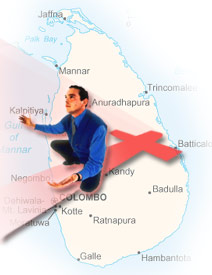 A January 23 report from the National Christian Evangelical Alliance of Sri Lanka outlined three separate incidents of persecution against Sri Lanka's Christian community since the beginning of 2006.
A January 23 report from the National Christian Evangelical Alliance of Sri Lanka outlined three separate incidents of persecution against Sri Lanka's Christian community since the beginning of 2006.On January 1, the King's Revival Church in Alawwa was subjected to verbal threats and abusive language as the pastor and a small group of Christians gathered for Sunday worship.
On the evening of January 21, a mob of approximately twenty men armed with sticks walked into the home of an Assembly of God pastor in Alpitiya. Only the pastor's wife and her three small children were at home at the time. The mob demanded that the pastor stop all Christian activity. They then overturned much of the furniture before leaving. The worship service was held the next day as scheduled, but with police protection.
Following the worship service on January 22, a mob of approximately 500 militant Buddhists surrounded the fifty worshippers of the Assembly of God Church in Bolaththa, Ganemulla and demanded that they stop holding services. The militants threatened to return the next Sunday if services continued. Early the next morning, the pastor's house was also stoned. Windows were damaged in the attack.
Pray that these threats and attacks in Sri Lanka will not cast a shadow of fear over the country's believers. Pray that they will be able to continue to corporately enjoy the presence of their Saviour without fear of those who can only destroy the body (Matthew 10:28).
For more information on the persecution facing Sri Lankan Christiansclick here. Video reports on Sri Lanka can be viewed on www.vomcanada.com.
-
Christians Prevented from Attending Christmas Service
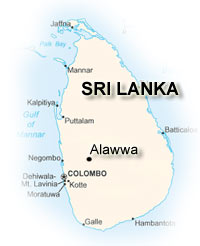 Members of the King's Revival Church in Alawwa, Sri Lanka were making their way to church on Christmas Day when a mob stopped them and threatened them with violence if they did not turn back. According to a December 29 report from the National Christian Evangelical Alliance of Sri Lanka (NCEASL), many fled in fear while those who attempted to continue on to the church were beaten. Four believers were injured, including a pregnant woman. One man required treatment at a local hospital. It is believed that a local political organizer is responsible for the attacks. The pastor of the church had been warned earlier to not have a Christmas Day service.
Members of the King's Revival Church in Alawwa, Sri Lanka were making their way to church on Christmas Day when a mob stopped them and threatened them with violence if they did not turn back. According to a December 29 report from the National Christian Evangelical Alliance of Sri Lanka (NCEASL), many fled in fear while those who attempted to continue on to the church were beaten. Four believers were injured, including a pregnant woman. One man required treatment at a local hospital. It is believed that a local political organizer is responsible for the attacks. The pastor of the church had been warned earlier to not have a Christmas Day service. Pray that there will be true justice and that the rights of Sri Lankan Christians to worship freely will be respected. Pray for full healing for those involved in the attack. Pray also that the congregation will experience a renewed sense of determination to share Christ with their lost neighbors.
For more information on Sri Lanka and the persecution of Christians there,click here. Video reports are also available on www.vomcanada.com.
-
Election Results Raise Concerns
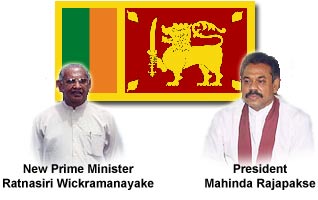
Sri Lanka's Christian community is facing renewed concerns about future religious freedoms following the results from the November 17 presidential election. Prior to his election, Mahinda Rajapakse had formed an alliance with the Jathika Hela Urumaya (JHU), a party composed entirely of Buddhist monks whose primary purpose has been to pass anti-conversion legislation in Sri Lanka. In his first address as president, Rajapakse pledged to protect Buddhism but also provide freedom for all other religions. It remains to be seen how this will be demonstrated. His appointment of Ratnasiri Wickramanayake as Prime Minister raises further concerns. Wickramanayake had previously served as Minister of Buddhism and was responsible for the introduction of the government's anti-conversion bill, ironically called the "Freedom of Religion Bill." For more information on Sri Lanka,click here. A video report from Sri Lanka is also available at www.vomcanada.com.
-
Sri Lankan Constitution Amendment Thwarted
An amendment to the Sri Lankan constitution scheduled for second reading on October 4 has been delayed because of a lack of support for the debate. While the private member's bill was not taken up this time, it is possible for it to be taken up at a later date.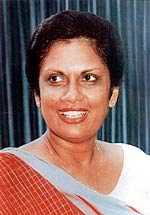 Chandrika Bandaranaike Kumaratunga,
Chandrika Bandaranaike Kumaratunga,
President of Sri LankaThe JHU, a political party composed entirely of Buddhist monks, has reacted strongly to reports that the government will shelve their anti-conversion bill. They accused the United States of "interfering in religious affairs and human rights in the country." It is likely that the government will want to avoid this controversy at this time because of presidential elections on November 17.
-
JHU Moves to Make Buddhism Sri Lanka's Official Religion
In a strategic move, while public attention in Sri Lanka is focused on upcoming presidential elections, a constitutional amendment aimed at making Buddhism the official religion of Sri Lanka has been put on the Parliamentary Order Paper for a second reading on October 4 by the Jathika Hela Urumaya (JHU). The JHU is a party made up entirely of Buddhist monks. Earlier the Sri Lankan Supreme Court ruled that parts of this amendment were unconstitutional. Consequently, a two-thirds majority vote of parliament and a national referendum would be required for the amendment to pass.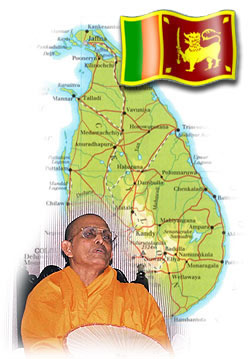 Ven. Ellawala Methananda Thera
Ven. Ellawala Methananda Thera
President of the JHUThe National Christian Evangelical Alliance of Sri Lanka (NCEASL) is concerned that the legislation may pass virtually unnoticed, with attention diverted to the upcoming elections. The NCEASL is calling for advocacy and has published a documentoutlining their concerns with the proposed amendment. Contact information for Sri Lankan government officials through www.srilankanchristians.com.
For more information on Sri Lanka and the challenges facing Christians there,click here. An extensive video report released earlier this year by The Voice of the Martyrs entitled, "Faith Under Fire: Sri Lanka," is available for viewing on www.vomcanada.com.
-
Sri Lankan Police Order Christians to Stop Meeting
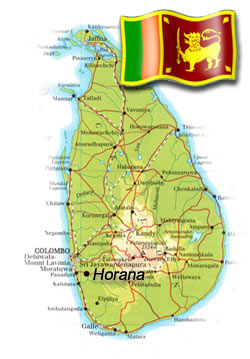 On Sunday, August 7, twelve Christians from the Foursquare Gospel Church in Horana, Kalutara District met for worship, despite threats by a mob the previous week. According to an August 9 report from the National Christian Evangelical Alliance of Sri Lanka (NCEASL), approximately fifty Buddhists disrupted the service, demanding that the Christians leave and not return.
On Sunday, August 7, twelve Christians from the Foursquare Gospel Church in Horana, Kalutara District met for worship, despite threats by a mob the previous week. According to an August 9 report from the National Christian Evangelical Alliance of Sri Lanka (NCEASL), approximately fifty Buddhists disrupted the service, demanding that the Christians leave and not return. The pastor called the police and both sides were asked to come to the police station. The mob claimed that the Christians had no right worshipping in the village which is almost entirely Buddhist. Though the police inspector acknowledged the Christians' right to worship, he ordered the Christians to stop meeting immediately since their meetings were disturbing the peace. They were further told they could not meet anywhere else.
Pray for these believers as they consider their response at this point. Pray for Christians throughout Sri Lanka facing intimidation from those opposed to the spread of the Gospel.
For more information on the challenges of being a Christian in Sri Lanka,click here. Earlier this year, The Voice of the Martyrs Canada released a new video report, "Faith Under Fire: Sri Lanka," available from our online catalog. A 14-minute excerpt of this video is available online for the first time in the Video section of VOMC's multimedia website, www.vomcanada.com.
-
Church Buildings Attacked and Worker Injured
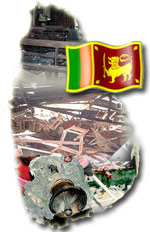 Two incidents in recent weeks demonstrate that religious tensions in Sri Lanka have not abated. According to a report from the National Christian Evangelical Alliance of Sri Lanka (NCEASL), a church in Kayankerny in the Batticaloa District was damaged in the early morning of July 7 when dynamite detonated in three places around the foundation of a newly constructed building. The walls, roof and floor were damaged.
Two incidents in recent weeks demonstrate that religious tensions in Sri Lanka have not abated. According to a report from the National Christian Evangelical Alliance of Sri Lanka (NCEASL), a church in Kayankerny in the Batticaloa District was damaged in the early morning of July 7 when dynamite detonated in three places around the foundation of a newly constructed building. The walls, roof and floor were damaged.On July 16, the Holy Cross Church in the town of Pulasthigama was attacked by a group of hooded men who began smashing the furnishings. A fire was set in the church that complete destroyed the building. Two young men in the building at the time and were beaten. One, Angel Rukmal Fernando, 19, was admitted to the Polonnaruwa hospital. The attack was widely condemned by politicians and religious leaders, including the Buddhist leader, Pahamune Sumangala Thero.
Pray that Christians in Sri Lanka will be free to practice their faith without fear of violence by those opposed to their message. Pray that those fighting against the Church will see the love of Christ in the lives of believers and come to repentance and faith in the Lord.
For more information on the persecution of Christians in Sri Lanka,click here. Two video reports on Sri Lanka are also available for viewing on www.vomcanada.com.
-
Escalating Violence Against Christians in Sri Lanka
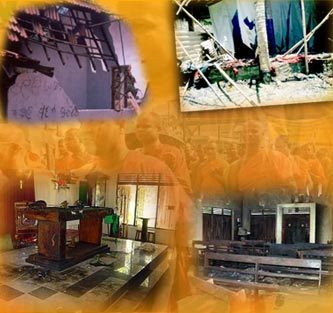
For reasons known only to those responsible, the number of attacks on Christian churches in Sri Lanka has increased dramatically over the last month. A press release from the National Evangelical Alliance of Sri Lanka (NCEASL) gives the following list of incidents since May 29.
The Kithu Sevana Church in Kaluvilapothane, Ambanpola has been meeting in the same location for the past ten years. On Sunday, May 29, ten Christians had gathered to pray when a crowd of approximately one hundred, together with a local Buddhist monk, disrupted their prayer meeting. The local believers were threatened and told to stop conducting meetings. A visiting pastoral worker was told to not return. Because of fears of another attack, the next prayer meeting scheduled for the following Sunday was cancelled.
In the Batticaloa District, the NCEASL, in partnership with The Voice of the Martyrs in Canada, has been constructing a leadership training centre amidst threats. On February 29, the building where construction workers stayed was burned down. On the night of June 2, the home of the family who donated the land for the training centre was set on fire. The family was able to escape without injury and extinguish the fire before the entire house was destroyed.
The Assembly of God Church building in Ambalangoda (Galle District) was destroyed in the December tsunami and the church was fortunate to purchase a new building on June 4. The following night, however, the windows of the building were smashed with rocks and bottles. The street lights had mysteriously been switched off during the attack. The next morning, a mob of around one hundred surrounded the building, hurling threats at the Christians. By mid-afternoon, the threats turned to violence as the crowd invaded the building and attacked two parishioners and the pastor. The three were brutally beaten and required treatment. One is reported to be in serious condition. Further threats of violence against the men have been reported. The church building also suffered serious damage in the attack. The pastor's van was damaged and his wallet, identification and cellular phone were stolen.
Pray that the increased violence will subside. Pray for the healing of those injured in the Ambalangoda attack. Pray for courage for the believers facing ongoing threats against them. Pray that proposed legislation banning religious conversions will not pass in the Sri Lankan parliament.
For more information on persecution in Sri Lanka,click here or visit VOMC's multimedia website, www.vomcanada.com for video news reports from Sri Lanka.
-
Sri Lanka Update: Court Hearing
On June 6, a court hearing was held for two men accused of assaulting and attempting to rape four female pastoral workers from the Assembly of God Church in Kotadeniyawa. The two are also charged with damaging the church premises. Though the lady pastor faced particularly tough questioning in the hearing, she was able to maintain her composure and not be intimidated. The next hearing is scheduled for September.
The two men on trial were among thirty who attacked the women in September 2003. The four victims were falsely accused of being prostitutes and were later charged with breach of peace.
-
Sri Lankan Pastors Face Threats from Police
A May 31 report from the National Christian Evangelical Alliance of Sri Lanka (NCEASL) recounts three situations in which pastors have faced threats from police in the past two weeks.
On May 19, pastors went to meet with police over threats received by an Assembly of God Church in Polonnaruwa. Rather than receiving support from the police, they were instructed to stop all Christian activities and to not build any church buildings in Polonnaruwa, since it is a Buddhist area. They were threatened with arrest for breach of peace if they continued to meet in the area.
Charges of breach of peace have been filed against the pastoral worker of an independent church in Halpita, Polgasowita. On May 15, Buddhist protestors demanded that the church be closed. On May 27, the pastoral worker was summoned to appear before the Kesbewa Magistrates Court on May 30.
On May 30, a pastor in the village of Bendiwewa was asked to come to the local police station for a discussion with the local Buddhist monk and community leaders. The pastor was asked to explain the ministry of the church. Stating that they do not wish to resort to violence, the monk and leaders requested that a church building not be built in the village and the pastor not engage in evangelism. The police requested that the pastor confine all his activities to the five Christian families in the church. He was given the impression that he would be welcome to stay if he did not introduce Christianity to anyone outside of the church.
Pray for each of these churches facing opposition from members of the community as well as the authorities. Pray that all charges will be dropped. Pray that the proposed anti-conversion legislation will not pass in the Sri Lankan parliament. Pray that Sri Lankan Christians will continue to share their faith despite pressure to remain silent.
For more information on Sri Lanka and the difficulties facing Christians there,click here. Video clips from Sri Lanka are also available on VOMC's multimedia website, www.vomcanada.com.

